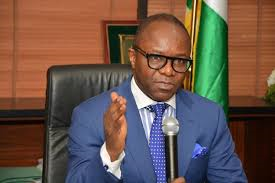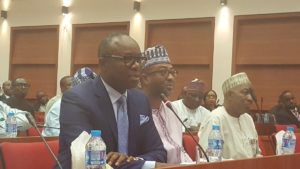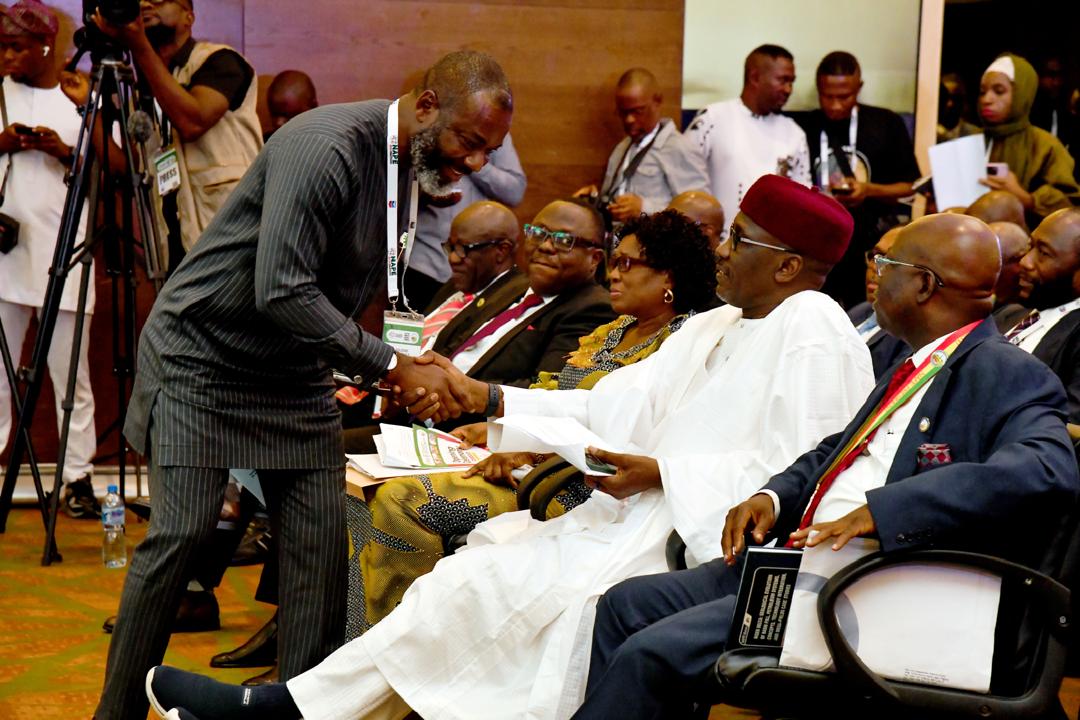Energy
PIGB: FG proposes single industry regulator

By Yemie ADEOYE
IN an effort to harmoise the controversial Petroleum Industry Governance Bill (PIGB) formerly PIB, and ensure its smooth and prompt passage by the national assembly, the federal government has proposed the concept of a single regulator for the petroleum industry.
The Minister of state for petroleum resources, Dr. Ibe Kachikwu made this known when he appeared for the stakeholder and public hearing hosted by the National Assembly Joint Committee on Petroleum Industry Governance Bill recently.

From left: The Honourable Minister of State for Petroleum Resources, Dr. Emmanuel Ibe Kachikwu; Senior Technical Adviser on Policy and Regulation to the Minister, Mr. Adegbite Adeniji; and Director, Gas Department at the Ministry of Petroleum Resources, Mr. David Hassan at the public hearing today.
According to the Minister what Nigeria needs going forward is a regulator that covers the field, as opposed to dissipated regulatory power amongst agencies. The regulator should cover upstream, midstream and downstream oil, gas and products regulation, as well as technical, economic and HSE regulation. S.8 of the PIGB provides that the Commission will issue regulations in respect of a number of specified matters in order to give proper effect to the Act.
“There needs to be careful calibration of the relationship between the role of the Minister as the institution charged with overall supervision of the industry vis a vis that of the super regulator as the institution responsible for regulation. The calibration must ensure checks and balances on regulatory power through tools such as administrative law; however, it seems essential that the power to issue regulations should at all times reside with the Minister.
This ensures that power to issue delegated legislation is placed in the hands of the appropriate member of the executive with responsibility both to the President and also to the National assembly in terms of oversight. The counter check on this is that the technical issues are handled by the regulator, for consideration of the Minister, who upon approval of the recommendation, will issue the appropriate regulation.
There are several matters in the bill that are not regulatory in nature which will require regulations. It will be an aberration if these matters, which are squarely within the purview of the Minister, to be delegated to the Commission. Minister should issue regulations upon the advice of the Commission.
A core aspect of the reforms that we propose to the effectiveness of the Minister’s powers to issue policies, supervise the industry and manage Nigeria’s petroleum resources, is the need for a well-resourced and solid technical back office. Hence, the National Oil Policy and the National Gas Policy contains proposals for institutional reforms at the Ministry of Petroleum Resources in this regard. It is our position that the PIGB should address this long standing issue legislatively by creating a Petroleum Technical Directorate.”
Kachikwu stated further that S.13 Does not envisage a position for the Minister on the Board of the Commission. We propose that the Minister Chair the Board of the Commission to ensure effective interface between the regulatory and policy making institutions. The PIGB proposes 4 year terms for Commissioners.
“May I respectfully suggest that we accord with best practice by introducing staggered terms for Commissioners this should be considered in order to ensure continuity in the governance of the Commission such that at no time would there be no executive commissioners in office.
Also An essential regulatory tool for a sector that is being liberalized is the need for the Commission to be granted competition regulatory powers, especially in light of the nature of the midstream which is network bound and has several monopoly features that need to be carefully managed, otherwise we will be substituting government monopolies with private monopolies as we liberalise the sector.
Another essential issue, going forward, is the need to establish a registry of records for all the titles to be issued and managed by the commission. This will aid public access to information, and the due diligence reviews by third parties into assets.
The composition of the board of the Commission should ensure linkages to critical and related sectors. As such, non-executive members of the commission should include the representatives from the Ministries of petroleum, power, finance and environment. Experiences from these sectors will no doubt enrich the work of the Commission.
For focus, it is recommended that from the outset the Commission should be constituted with the following departments: Upstream regulation, Midstream and Downstream Oil Regulation, Midstream and Downstream Gas Regulation, Health Safety & Environment.”
Speaking on the Government’s role on the commercial side, the minister noted that “the reforms that we commenced earlier on in the year need to be sustained through legislation. The critical issues here are governance, funding, efficiency and accountability of the commercial entities.”
The Minister further opined that A National Oil Company(NOC) needs to be created as a holding company for an integrated operation that will operate on a fully commercial basis with the following recommendations. “On Funding-A key plank of our reforms is to ensure that the national oil company is able to operate without recourse to the treasury such that funds that could otherwise be sequestrated for our upstream commitments can be deployed by the treasury to meet urgent needs in other social sectors. Ultimately, the National Oil Company needs to acquire an investment grade status if it is ever to achieve these objectives.
This will require a new way of governance and a different type of National Oil Company than currently exists. For one, it must be insulated from political interference in its operations. It must also run commercially and efficiently if it is to be able to attract funding from debt and capital markets. The governance structure and terms of reference must therefore be clearly stated and legislation must provide it a pathway to independently and sustainably raise its own funding, Hence, our recommendation is that there should be an explicit provision in the Bill that clarifies that the National Oil Company shall cease to be funded from the federation account and shall have the power to raise funding for its operations from the debt and capital markets.
The NOC should be structured as a holding company to be chaired by the Minister, The NOC to be an integrated holding company comprising semi – independent upstream, midstream and downstream with their own CEOs and Board of Directors, CEO / GMD of NOC to be appointed by the President upon the advise of the Minister , Position of CEO / GMD of the NOC to be tenured but subject to fulfilment of annual Key Performance Indicators and targets to be set by the board. The CEO / GMD of Holding Company may only be removed for failing to fulfill KPIs and for misconduct.
We have noted that the PIGB requires a lower level of experience than one would ordinarily expect for the membership into the board. We recommend that this be revisited such that the Group Managing Director should have no less than 20 years managerial experience, whilst the executive directors should have a minimum of 15 years senior management experience.
Stock exchange governance rules should apply to the NOC immediately it is incorporated right up till when it is eventually listed, and MDs of each subsidiary to sit on NOC Board.
Following best practice, independent board members should be appointed to the board. As for the subsidiaries, similar rules relating to governance and funding should apply, the main difference being that the Group Managing Director should chair the board of each subsidiary.
We also support the creation of an asset management company that will manage government’s interest in specific upstream assets that will be transferred to the company, whilst leaving the National Oil Company to operate as a refocused integrated company”.
Energy
Awards Galore For Shell, Staff At NAPE 2024 Conference

The Shell companies in Nigeria and staff won awards in recognition of their robust participation at the 42nd Annual International Conference and Exhibition of the National Association of Petroleum Explorationists (NAPE), held in Lagos.
At the closing dinner of the event, the Managing Director of Shell Nigeria Exploration and Production Company (SNEPCo), Ronald Adams pledged sustained efforts by the company to address “the Nigerian energy trilemma by powering progress towards energy security in a sustainable manner”.
On the awards, the Shell was declared Best Overall Exhibitor and Best Exhibiting Energy company (International) just as Geophysicist Somime Oguntola took home the Award of Excellence for Oral Paper (second place).
The icing on the cake was a Shell staff, Johnbosco Uche, being installed as the new President of the NAPE.
It was gathered that the Shell companies in Nigeria have supported NAPE since its founding in 1975, using the skills and expertise of the large pool of energy professionals in its employment to improve its activities especially educational and mentoring programmes.
In addition to being a major sponsor of the 2024 conference, Shell mounted a high-profile exhibition, featuring among other things, career counselling, engagements on Nigerian Content and Contractor development and panel sessions on Women in Industry and Sustainability Energy Challenge.
A highlight was the Shell medical stand which attended to more than more than 500 conference participants and members of the public over the four days of the annual event. The doctors and nurses offered a wide range of services including laboratory tests, deworming, medical consultation as well as ophthalmology checks and distribution of nearly 300 eyeglasses.
Adams referred to the operations of SNEPCo as an example of Shell’s contribution to energy security in Nigeria. “As a result of sustained production from Bonga, we have provided funds to finance development, created a new generation of Nigerian Deepwater professionals, empowered indigenous contractors and service providers, and implemented social investments that have touched lives in the six geo-political zones of the country,” he said.
Adams added, “SNEPCo and indeed Shell are in Nigeria for the long haul. Our commitment is reflected in both our current and growth plans, all of which are grounded in principles of safety, affordability, and competitive performance.”
Energy
Accugas Denies Culpability In Akwa Ibom’s Power Outage

Owing to the persistent power outage, which has crippled economic and social life in most parts of Akwa Ibom State and environs, Accugas Limited has washed its hands off the ugly situation.
This was contained in a statement under the signature of its Communications Manager, Okwudili Onyia, in which the company traced the anomaly to a “fault in the 132-KV Aba-Itu transmission line”.
To ameliorate the situation, the company maintained that “It is imperative that the restoration of the Aba-Itu line is completed as soon as possible.”
In addition, the company pledged thus, “Accugas will continue to partner with, and support, the government of Akwa Ibom State towards achieving the government’s agenda for economic development and prosperity of the state.”
ALSO READ: NNPC Ltd To Supply 100mmscf/d Gas To Dangote Refinery
The statement reads, “Accugas Limited, a subsidiary of Savannah Energy, wishes to strongly deny the misinformation concerning its alleged involvement in the current power outage in Akwa Ibom State.
“The power cut in Akwa Ibom State is entirely due to the reported fault in the 132-KV Aba-Itu transmission line, which, unfortunately, is preventing power being transmitted from the National Grid into the State. It is imperative that the restoration of the Aba-Itu line is completed as soon as possible.
“Ibom Power Company (“IPC”) is one of 23 thermal power generation companies which channel power to the National Grid, which in turn disseminates all accumulated power to each State of the Federation through the electricity distribution companies (“Discos”). Indeed, Accugas supplies gas to enable c. 20% of Nigeria’s thermal generation capacity and, as such, is a critical enabler of the Nigerian economy.
“Within Akwa Ibom State, Accugas has been the sole supplier of gas to IPC since 2014 and, together with other Savannah subsidiaries, has invested over US$1.5 billion in gas development within the state. Furthermore, Savannah has recently invested c. US$45 million in a gas compression project at Accugas’ Uquo central processing facility at Esit Eket. Accugas’ commitments also extend to several social investment projects in the state. All the foregoing investments and projects, including other imminent investments Accugas intends to make in the State, demonstrate the Company’s long-term commitment to Akwa Ibom State and Nigeria.
“Accugas will continue to partner with, and support, the government of Akwa Ibom State towards achieving the government’s agenda for economic development and prosperity of the state.”
Energy
NCDMB Seeks Industry-wide Support for FDIs, NOGOF, Others, To Ramp Up Crude Output, Energy Security

As the 42nd Annual International Conference and Exhibition of the Nigerian Association of Petroleum Explorationists (NAPE) got underway in Lagos on Monday, the Nigerian Content Development and Monitoring Board (NCDMB) has canvassed industry-wide support for initiatives that would reverse negative trends in Nigeria’s energy sector.
The Executive Secretary, NCDMB, Engr. Felix Omatsola Ogbe, made the assertion in a paper entitled “Resolving the Nigerian Energy Trilemma: Energy Security, Sustained Growth, and Affordability”.
He identified “alarming scale of pipeline vandalism and theft of crude oil” as the biggest threats to Nigeria’s energy security, noting that major oil and gas projects are required as well as a robust security strategy based on mutually beneficial collaboration with host communities.
To achieve the above objectives, the Board has undertaken to work with stakeholders in the industry to dedicate one week in every calendar year to signing Final Investment Decisions (FIDs) on new projects, as prospective investors could be motivated to act expeditiously to meet agreed-upon deadlines and regulators are similarly encouraged.
Engr. Ogbe noted that FDIs would “catalyze new projects in the Nigerian oil and gas industry,” and that fruitful collaboration amongst stakeholders and NCDMB would actualize the intentions of the Presidential Directives rolled out in March 2024 by The Presidency, and thus “fast-track the contracting cycle and incentivize investments in our sector.”
The NCDMB boss, who was represented by the General Manager, Corporate Communications and Zonal Coordination, Esueme Dan Kikile, Esq., suggested that the FDI Week be incorporated into any of the major oil, gas and energy conferences held in the country.
According to him, the Board holds a similar biennial event called Nigerian Oil and Gas Opportunity Fair (NOGOF), which is attended by all the international and indigenous operating companies to share awareness of opportunities and projects to be executed.
On the Board’s strategy to create a safe and secure operating environment for oil and gas companies and thus eliminate the huge costs associated with vandalism and attacks on personnel and installations, the Executive Secretary disclosed that NCDMB has introduced a new policy known as “Back to the Creeks Initiative.”
According to him, “We are convinced at the Board that the incessant tampering with crude oil pipelines and hostilities in oil-producing communities have a huge impact on energy security,” and that the new initiative is geared towards curtailing incidences of disruptions of oil industry operations through targeted interventions. These include execution of corporate social responsibility projects in communities, provision of affordable finance to local contractors, upgrade of basic educational facilities in villages and communities, building the capacity of teachers and improving the infrastructure at that level.
The initiative, whose details would soon be publicized, is expected to create a stakeholder feeling in host communities and make them view industry assets around them as facilities that are bound up with their socio-economic well-being.
Such an orientation would translate into safety of assets, increased crude oil production, drastically reduced security costs and more favourable pricing of petroleum products, he added.









